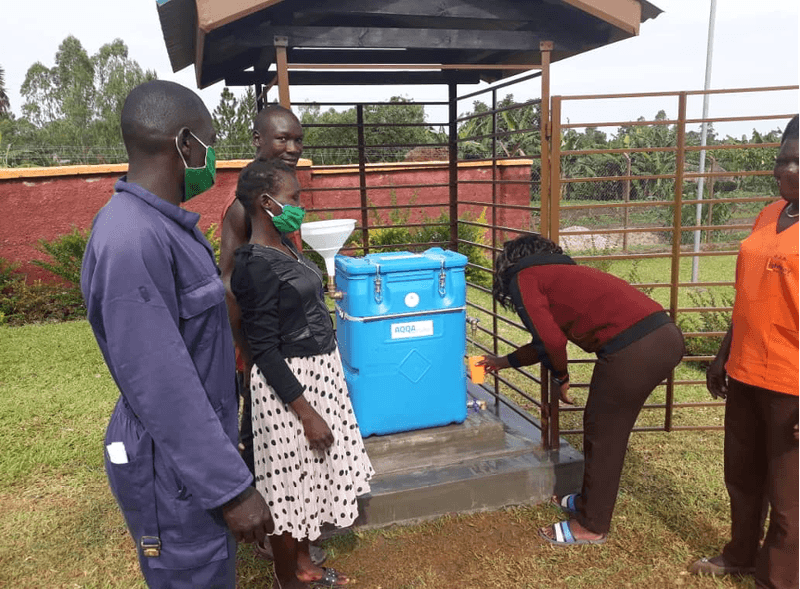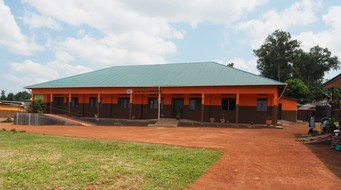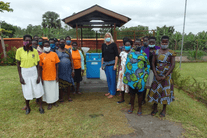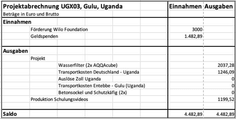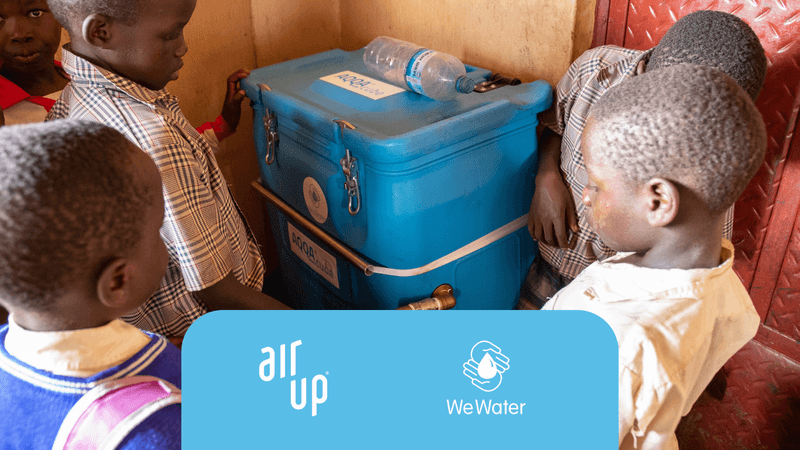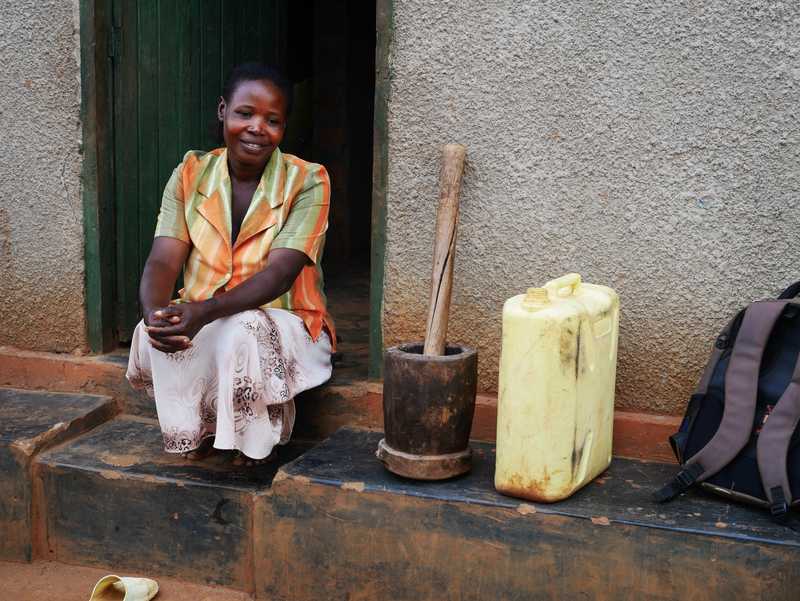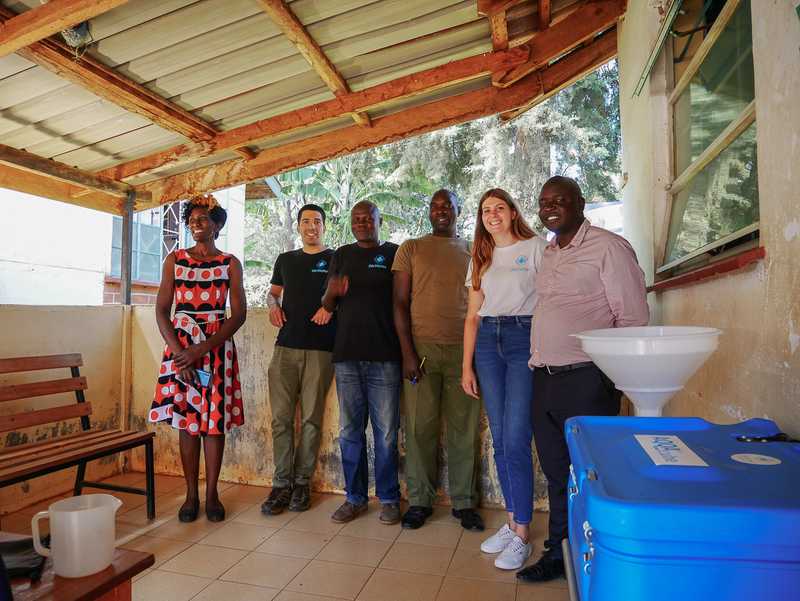In 2020, nothing went as planned. Nevertheless, there were rays of hope, for example in our project with the Lichtstrahl Uganda association. You can read our complete project report here.
The initial situation
The project Lichtstrahl Uganda e.V. in Gulu, Uganda, is about a six hour drive from the capital Kampala. The association runs a project there with the aim to provide immediate measures in acute emergency situations for sick and pregnant people and help for self-help for people in northern Uganda. The project cares for about 900 people per day. It includes a medical station with a laboratory, a maternity ward, a café and restaurant with a training station, shelters, training facilities, schools and other facilities.
Until now, there was no supply of clean drinking water. Hygienically clean water for the medical station as well as for the maternity ward was urgently needed. In theory, there would be enough water available. The people get it from a borehole. However, the water has been tested by a laboratory and found to be undrinkable and contaminated with bacteria. It is known to make people sick. The project needs at least 1000 liters of drinking water per day. In addition, filtered water is also needed for the maternity and infirmary.
The original project planning…
The plan was to treat the existing water supply for the Lightray project in Gulu into clean drinking water using the two AQQAcube mobile water filters. Thanks to the combined filter capacity of 2400 liters per day, this would enable us to meet the demand for the entire project site.
The project implementation was planned for the end of January 2020 – via sea shipping. The transport should take about four weeks. In March or April 2020, a WeWater team was supposed to receive the filters and transport them to Gulu to the Lightray project.
But as with many endeavours this year, our carefully planned execution was compromised by the Corona pandemic. Due to travel regulations issued by the State Department, we had to react quickly. Our contracted shipping company cancelled the filter shipment to Uganda. We cancelled our flights. In the meantime, a harsh curfew was imposed in Uganda, so that transporting the filters within the country also became an impossibility – even if we could ship them to Uganda. For the installation and training on site, 14 days were actually planned; the team was scheduled to return in mid/late April 2020.
From then on, all this was no longer possible; we had to rethink. The pandemic does not stop at a lack of drinking water; it rather aggravates an already difficult situation.
Meanwhile, in Berlin, we decided to produce training videos for our filter systems. While we were reducing our own contacts, we were discussing a plan to be able to act quickly once the transportation of goods worldwide would normalize itself. Thanks to our training videos, the filtration units could be put into operation without requiring our presence on site.
Videos were produced for the installation of the filters, general operation, maintenance, cleaning, and disinfection. The videos are available in German and English and with subtitles in Swahili and Luganda. The videos are freely accessible on our YouTube channel.
Finally, the transport
While the Corona case numbers settled down in May, we also found a shipping company that could transport the filters via air freight during the pandemic. At the end of May, the water filters flew from Germany to Uganda. For the transport within the country, the volunteers of Lightray Uganda supported us actively. During the lockdown they organized a legal transport of the filters. Furthermore, they took care of the release of the filters from the customs area in Entebbe at the beginning of June. Due to the Corona pandemic, customs had changed the conditions for clearing. Goods may now only be taken out of the customs area by means of an agent.
Installation of water filters at project site
We sent the training videos digitally to the project managers of the Lightray Association. The feedback we received was positive, the steps for commissioning explained in an understandable way.
The Lightray staff looked for suitable locations for the installation of the AQQAcubes: one was placed in front of the children’s home, the second in front of the infirmary. The Lightray employees poured a concrete base to protect the filters from contamination. A metal cage protects the filter from theft and vandalism. Access to the filter is gained through a lockable door.
Project completion
Heike Rath, association director at Lightray, was herself on site in Gulu in October to get a look of the current situation. The filters are running smoothly and are a necessary help to prevent diseases, especially in the current rainy season. During the rainy season there is a lot of water available, but it is heavily contaminated with bacteria.
We were thus able to successfully complete this project on October 24, 2020, with a delay of about half a year – due to the Corona pandemic.
Financial overview project accounting
Wilo Foundation supported the project with a sum of 3000€.
The release of the water filters from customs, the costs for the transport within Uganda as well as the costs for concrete base and protective cage were covered by Lichtstrahl Uganda e.V.[:]
